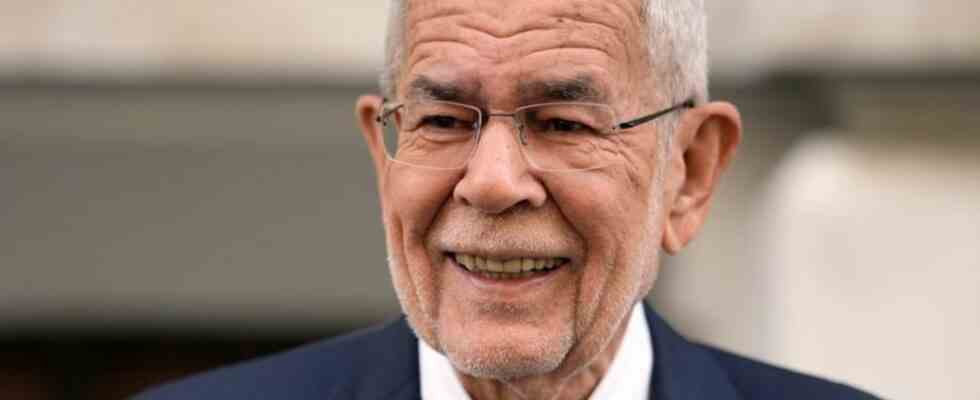choice
Van der Bellen remains President of Austria
Austrian President Alexander Van der Bellen smiles after casting his vote in Vienna. photo
© Markus Schreiber/AP/dpa
During the election campaign, incumbent Van der Bellen presented himself as a haven of peace in troubled times. The presidential election in Austria took place in a difficult environment, and not only because of the crises.
Alexander Van der Bellen has won the federal presidential election in Austria. According to the provisional final result on Sunday, the 78-year-old received 54.6 percent of the votes. Although the count does not yet take into account the expected more than 800,000 postal votes, projections by the ORF assume that the incumbent will ultimately receive around 56 percent approval.
According to projections, the right-wing FPÖ candidate, 60-year-old Walter Rosenkranz, received around 18 percent of the vote. The other five candidates are each in the single-digit percentage range. They included a blogger, a columnist and a shoe manufacturer. Around 66 percent of those entitled to vote took part in the election.
The Austrian Federal President has more powers than the German. The head of state, directly elected by the people, even has the power to dismiss the federal government. He can appoint chancellors and reject ministers. He is also Commander-in-Chief of the Army.
78-year-old Van der Bellen is the oldest Federal President to have run for a second term. He sees no problem in his old age. The office gives him strength, he said when voting on Sunday. Van der Bellen had been directly and indirectly supported by all parliamentary parties except the right-wing FPÖ. With an election campaign in which he avoided direct confrontation with his challengers, he “saved himself over the finish line,” said political advisor Thomas Hofer. So far, every incumbent Federal President had easily cleared the 50 percent hurdle, which saved him a runoff.
Six opponents
Never before had so many candidates applied for the post. However, most of Van der Bellen’s challengers have so far not attracted much attention in the political arena. They were considered outsiders from the start.
This was a different starting point for the 2016 election. At that time, the FPÖ candidate Norbert Hofer had clearly beaten Van der Bellen in the first ballot and was only defeated in the run-off. The election also made headlines because the second ballot had to be repeated due to irregularities in the counting on the instructions of the constitutional court.
Relief in Vienna
Top politicians and officials from the conservative ÖVP, the social democratic SPÖ and the Greens were pleased and relieved about the election result. The Austrians have ensured stable conditions, according to ÖVP General Secretary Christian Stocker. EU Commission President Ursula von der Leyen congratulated Van der Bellen on Twitter on the election victory. “In difficult times we stand for a united Europe,” wrote the German politician.
The ÖVP and the SPÖ had not entered their own candidate. An election campaign against an incumbent is considered hopeless – the parties preferred to save the money for it. The media criticized the fact that there were no women in the field of applicants.
Van der Bellen, son of an Estonian mother and a Russian father, comes across as deliberate and level-headed, sometimes a bit absent-minded. A university career as a professor of economics was followed by entry into politics. From 1997 he was the leader of the Greens in Austria for around ten years. The smoker and dog lover says he likes hiking. He has two adult sons from his first marriage.
Among other things, the 78-year-old had advertised himself with the slogan “Reason and stability in stormy times”. During the election campaign, the promise of continuity clearly stood out from one of the main topics of some of his candidates: Not least, they had discussed the question of whether they would dismiss the government. The right-wing populist Rosenkranz stood for a radical change of course and, like his party, rejects the EU sanctions against Russia.
Bad mood in the country
Although Van der Bellen could count on broad support from the political and social establishment, he is one of the less popular federal presidents. Opinion researcher Christoph Haselmayer said that many citizens, who have since changed their attitude towards the role of head of state, have been too reserved on day-to-day political issues. The 78-year-old hinted to reporters as he cast his ballot on Sunday that he could see his style changing in a second term.
In general, the mood among the population towards politics is currently very negative. In a survey presented by ORF on Sunday, only 16 percent of citizens said they were satisfied with the policy, 81 percent are “disappointed” or even “angry”. According to the survey, 64 percent now rate the development in Austria as negative – in 2016 it was 52 percent. “This is a significant tightening again,” said political scientist Peter Filzmaier on ORF.

